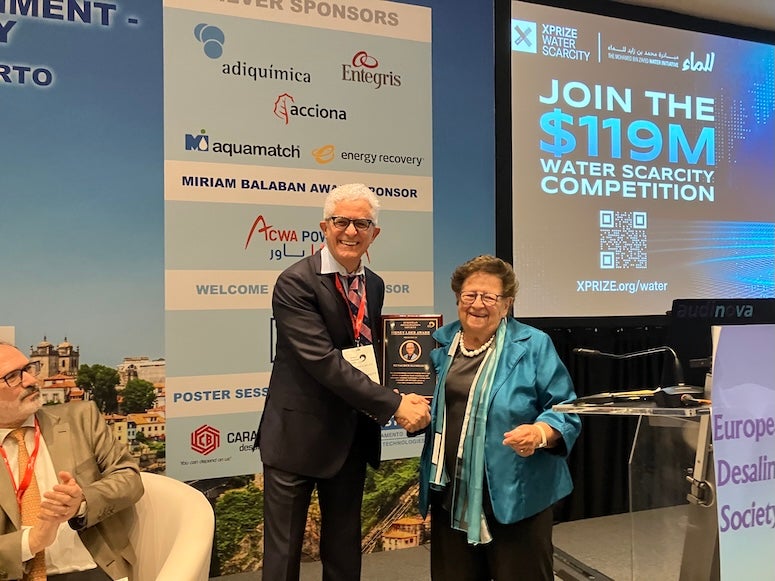
Rice University’s Menachem Elimelech was honored with the Sidney Loeb Award at the European Desalination Society Conference held in Porto, Portugal, April 28. The award recognizes his pioneering contributions to the science and application of membrane-based water treatment technologies.
A globally renowned leader in the field of desalination and water purification, Elimelech was celebrated for his groundbreaking research that bridges fundamental science with practical solutions. His work focuses on developing advanced membranes and energy-efficient processes for desalination and wastewater reuse, offering more sustainable and affordable ways to deliver clean water to communities around the world.
“Receiving the Sidney Loeb Award is a tremendous honor, especially because it bears the name of one of the founding figures in membrane science,” said Elimelech, the Nancy and Clint Carlson Professor of Civil and Environmental Engineering and Chemical and Biomolecular Engineering. “Sidney Loeb’s vision transformed how the world accesses fresh water. I’m proud to contribute to that legacy by advancing technologies that help address the global water crisis.”
The award’s namesake, Sidney Loeb, was a visionary American Israeli chemical engineer whose ingenuity laid the foundation for modern desalination. Working with Srinivasa Sourirajan in the late 1950s and early 1960s, Loeb developed the first practical reverse osmosis membrane — an innovation that made it possible to desalinate seawater and brackish water using pressure-driven filtration.
Their invention was first tested in 1965 in Coalinga, California, where high mineral content had rendered the town’s water undrinkable. Using this new membrane technology, Loeb and Sourirajan successfully purified the local water supply, eliminating the town’s dependence on imported water. Their work turned reverse osmosis from a scientific concept into a scalable solution and remains one of the most important water technologies of the modern era.
But Loeb’s legacy didn’t stop at reverse osmosis. He also pioneered pressure-retarded osmosis and reverse electrodialysis — methods for harnessing salinity gradients to generate renewable energy, often referred to as “osmotic power.” His creativity and commitment to practical engineering solutions inspired a generation of scientists and engineers working at the intersection of water and energy.
“Professor Elimelech’s work exemplifies the spirit of the Sidney Loeb Award,” said Miriam Balaban, secretary general of the European Desalination Society. “His research has consistently pushed the boundaries of what is possible in membrane-based separation technologies, combining innovation, rigor and a strong commitment to solving some of the world’s most pressing water challenges.”
Elimelech leads the Rice Center for Membrane Excellence, a hub for innovation within the Rice WaTER Institute focused on developing next-generation membranes and separation processes for water, energy and environmental sustainability. His lab’s work includes membrane-based processes for energy-efficient desalination and wastewater reuse, advanced materials for next-generation environmental separation and water decontamination technologies and environmental applications of nanomaterials.
Throughout his career, Elimelech has authored more than 560 peer-reviewed publications and mentored over 100 doctoral and postdoctoral researchers. His contributions have earned him numerous accolades, including the Eni Prize for Protection of the Environment, election to multiple national engineering academies and recognition as a Clarivate Highly Cited Researcher.
“Clean water is a fundamental human right, and our research aims to ensure access to it for future generations,” Elimelech said. “This award is a testament not only to the work of my team but to the critical importance of global collaboration in advancing water technology.”

